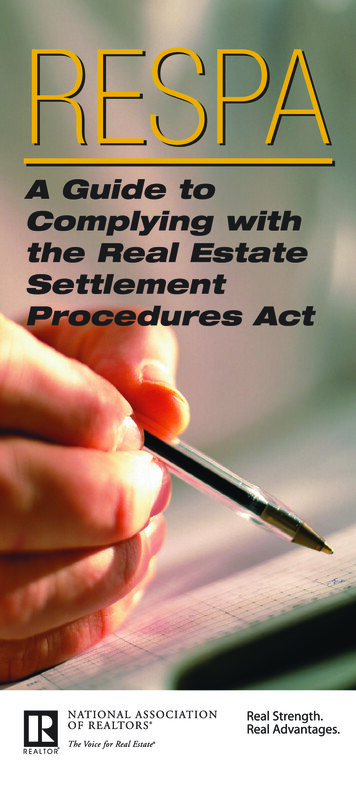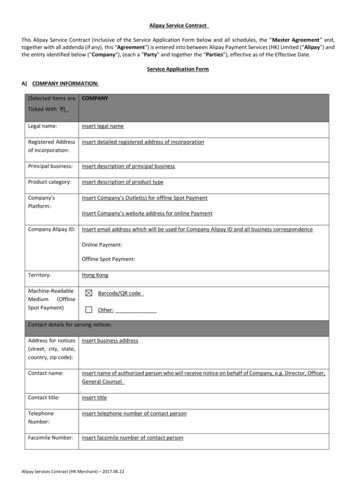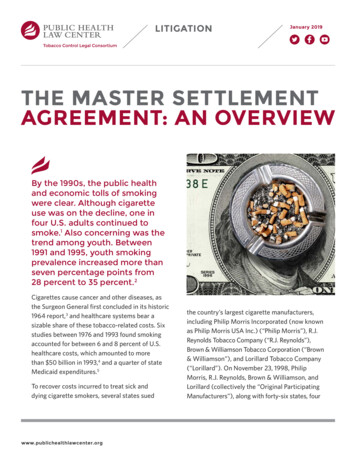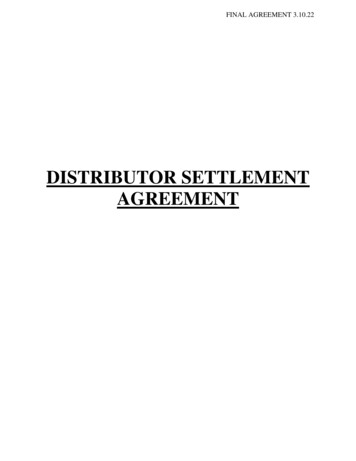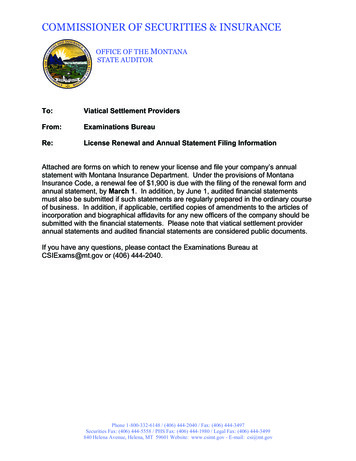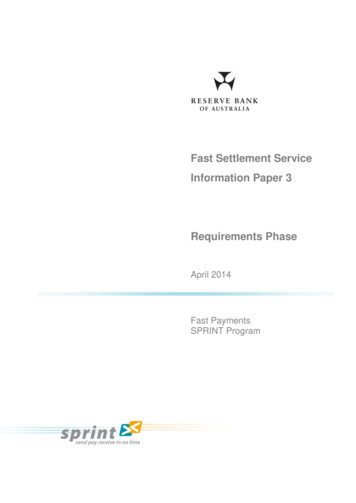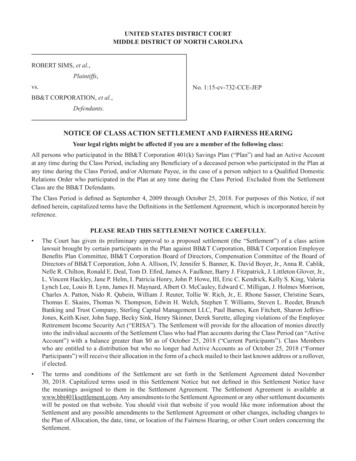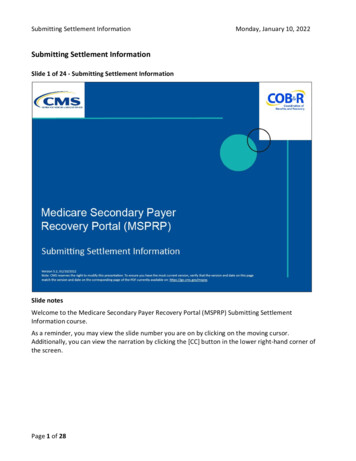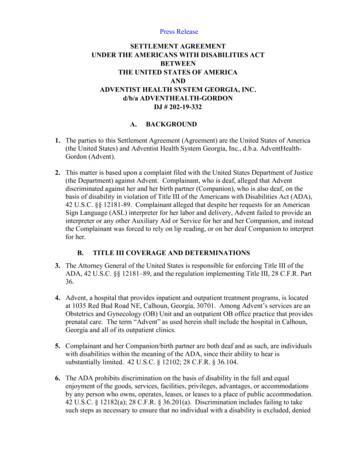
Transcription
Press ReleaseSETTLEMENT AGREEMENTUNDER THE AMERICANS WITH DISABILITIES ACTBETWEENTHE UNITED STATES OF AMERICAANDADVENTIST HEALTH SYSTEM GEORGIA, INC.d/b/a ADVENTHEALTH-GORDONDJ # 202-19-332A.BACKGROUND1. The parties to this Settlement Agreement (Agreement) are the United States of America(the United States) and Adventist Health System Georgia, Inc., d.b.a. AdventHealthGordon (Advent).2. This matter is based upon a complaint filed with the United States Department of Justice(the Department) against Advent. Complainant, who is deaf, alleged that Adventdiscriminated against her and her birth partner (Companion), who is also deaf, on thebasis of disability in violation of Title III of the Americans with Disabilities Act (ADA),42 U.S.C. §§ 12181-89. Complainant alleged that despite her requests for an AmericanSign Language (ASL) interpreter for her labor and delivery, Advent failed to provide aninterpreter or any other Auxiliary Aid or Service for her and her Companion, and insteadthe Complainant was forced to rely on lip reading, or on her deaf Companion to interpretfor her.B.TITLE III COVERAGE AND DETERMINATIONS3. The Attorney General of the United States is responsible for enforcing Title III of theADA, 42 U.S.C. §§ 12181–89, and the regulation implementing Title III, 28 C.F.R. Part36.4. Advent, a hospital that provides inpatient and outpatient treatment programs, is locatedat 1035 Red Bud Road NE, Calhoun, Georgia, 30701. Among Advent’s services are anObstetrics and Gynecology (OB) Unit and an outpatient OB office practice that providesprenatal care. The term “Advent” as used herein shall include the hospital in Calhoun,Georgia and all of its outpatient clinics.5. Complainant and her Companion/birth partner are both deaf and as such, are individualswith disabilities within the meaning of the ADA, since their ability to hear issubstantially limited. 42 U.S.C. § 12102; 28 C.F.R. § 36.104.6. The ADA prohibits discrimination on the basis of disability in the full and equalenjoyment of the goods, services, facilities, privileges, advantages, or accommodationsby any person who owns, operates, leases, or leases to a place of public accommodation.42 U.S.C. § 12182(a); 28 C.F.R. § 36.201(a). Discrimination includes failing to takesuch steps as necessary to ensure that no individual with a disability is excluded, denied
services, segregated, or otherwise treated differently than any other individual becauseof the absence of Auxiliary Aids and Services. 42 U.S.C. § 12182(b)(2)(A)(iii); 28C.F.R. § 36.303.7. On the basis of its investigation, the United States determined that Advent failed toprovide effective communication to the Complainant and her Companion duringComplainant’s hospital stay for the birth of Complainant’s child. Complainantrepeatedly requested an ASL interpreter for and during labor and delivery, and Adventdocumented in her medical records that both the Complainant and her Companion weredeaf and use ASL as their primary means of communication. Advent Personnelnevertheless relied primarily on oral communication throughout Complainant’s hospitalstay. As a result of Advent’s failure to provide an interpreter or other Auxiliary Aidsand Services, the Complainant did not understand why she was not given an epiduraland suffered significant pain. Both she and her Companion were scared for the safety ofthe baby during delivery because they did not understand what was occurring,particularly when an emergency arose. Even after the delivery, Advent Personnelcontinued to rely on oral communication resulting in misunderstanding about medicationgiven to the Complainant and a vaccination for the baby. Both the Complainant and herCompanion were denied the ability to exchange medical information about theComplainant or the baby with Advent Personnel and Staff. As a result, both womensuffered unnecessary stress, fear, and confusion.8. On the basis of its investigation, the United States determined that Advent discriminatedagainst the Complainant and her Companion in violation of Title III of the ADA byfailing to provide them with Auxiliary Aids and Services necessary for effectivecommunication, in violation of 42 U.S.C. § 12182(b)(2)(A)(iii) and 28 C.F.R. § 36.303.Advent denies that it discriminated against Complainant and her Companion, but hasagreed to enter this Settlement in order to avoid litigation. Advent has fully cooperatedwith the United States’ investigation.C.9.DEFINITIONSThe term “Auxiliary Aids and Services” includes Qualified Interpreters provided onsite or through video remote interpreting (VRI) services; note takers; real-timecomputer-aided transcription services; written materials; exchange of written notes;telephone handset amplifiers; assistive listening devices; assistive listening systems;telephones compatible with hearing aids; closed caption decoders; open and closedcaptioning, including real-time captioning; voice, text, and video-basedtelecommunications products and systems, including text telephones (TTYs),videophones, and captioned telephones, or equally effective telecommunicationsdevices; videotext displays; accessible electronic and information technology; or othereffective methods of making aurally delivered information available to individuals whoare deaf or hard-of-hearing. 28 C.F.R. § 36.303(b)(1).10. The term “Advent Personnel” means all Advent employees, whether part-time or fulltime, who have, or are likely to have, direct contact with Patients or Companions asdefined herein.2
11. The term “Patient” shall be broadly construed to include any individual who is deaf orhard of hearing seeking access to, or participating in, the goods, services, facilities,privileges, advantages, or accommodations of Advent.12. The term “Companion” means a person who is deaf or hard of hearing and is a familymember, friend, or associate of an individual seeking access to, or participating in, thegoods, services, facilities, privileges, advantages, or accommodations of Advent, who,along with such individual, is an appropriate person with whom the publicaccommodation should communicate. 28 C.F.R. § 36.303(c)(1)(i).13. The term “Qualified Interpreter” means an interpreter who, via a VRI service or an onsite appearance, is able to interpret effectively, accurately, and impartially, bothreceptively and expressively, using any necessary specialized vocabulary. 28 C.F.R. §36.104. Qualified Interpreters include, for example, ASL interpreters, oraltransliterators, interpreters for individuals who are deaf-blind, and cued-languagetransliterators. For purposes of this Agreement, a Qualified Interpreter must also beknowledgeable about medical terminology.14. The term “Video Remote Interpreting (VRI) Service” means real-time, full-motionvideo and audio over a dedicated high-speed, wide-bandwidth video or wirelessconnection that delivers high-quality video images; a sharply delineated, continuousimage that is large enough to display the interpreter’s and the participating individual’sface, arms, hands, and fingers; and a clear, audible transmission of voices. 28 C.F.R. §36.303(f).15. The term “Members of the Medical Staff” or “Staff” means all affiliated physiciansand/or other health care professionals who have medical staff privileges that permit themto see and/or treat Patients at Advent.D.REMEDIAL ACTIONSNon-Discrimination Policies and Procedures16. Advent shall provide Patients and Companions with the full and equal enjoyment of theservices, privileges, facilities, advantages, and accommodations of Advent as requiredby this Agreement and the ADA.17. Consistent with 42 U.S.C. § 12182(b)(2)(A)(iii), Advent shall provide appropriateAuxiliary Aids and Services, including Qualified Interpreters, where such AuxiliaryAids and Services are necessary to ensure effective communication with Patients andCompanions. To determine the Auxiliary Aids and Services that are necessary foreffective communication, Advent will make the assessment(s) described in Paragraphs19-22 of this Agreement. Appropriate Auxiliary Aids and Services will be provided assoon as practicable. If the Appropriate Auxiliary Aid or Service is determined to be anon-site Qualified Interpreter, Advent will take all reasonable efforts, including themeasures described in this Agreement, to ensure that the on-site Qualified Interpreter is3
provided within the time frame described in Paragraph 25 of this Agreement. Whilewaiting for the arrival of an on-site interpreter, Advent will provide a QualifiedInterpreter by VRI no later than fifteen minutes after a request is made until such time asan on-site interpreter arrives. Advent will advise Patients and Companions who requireAuxiliary Aids and Services, that appropriate Auxiliary Aids and Services are availablethroughout the Patient’s stay.18. Within sixty (60) days of the effective date of this Agreement, Advent will submit arevised Effective Communication Policy, including its implementing practices andprocedures, to the Department for review, revision, and approval. Advent willimplement any revisions provided by the United States and send the policies, practicesand procedures back to the United States within thirty (30) days of receipt for review,revision, and approval.Assessment of Appropriate Auxiliary Aids and Services19. As soon as practical after a Patient arrives at the hospital or one of its clinics, Adventwill consult with each Patient and Companion to determine appropriate Auxiliary Aidsand Services, and the timing, duration, and frequency with which they may be needed.The assessment will consider all relevant facts and circumstances, including, forexample, the individual’s communication skills and knowledge, and the nature andcomplexity of the issues being discussed.20. Advent will notify all Patients and Companions of the availability of Auxiliary Aids andServices by use of a “Notice of Auxiliary Aids and Services,” (“Notice”) (Exhibit A),which it will prominently display in a frame at every Hospital admissions desk andprovider reception desk. That notice is intended to: i) afford prompt initial effectivecommunication between the Patient and Companion and the reception clerk, (by meansincluding Text, Pen and Paper, or a Qualified Interpreter via video on an iPad thatAdvent will maintain at every registration desk) and ii) facilitate a more robustinteraction about their communication needs for the appointment or hospital stay (whichmay include other means of communication including an on-site Qualified Interpreter).Once the Patient or Companion’s preferred method of effective communication has beenestablished for the registration process, Advent will ask the Patients or Companions toanswer questions about their preferred means of communication. Those questions willbe substantially similar to those contained in the “Auxiliary Aids and Services Form,”(“Form”) (Exhibit B).If a Patient and/or Companion does not initiate the request for the use of an auxiliary aidfor effective communication, but a registration clerk reasonably perceives that thePatient and/or Companion is deaf or hard of hearing, the registration clerk will provide apaper copy of the Notice of Auxiliary Aids and Services to the Patient and/orCompanion.4
Within 30 days of the execution of this Agreement, Advent shall train its staff to providethe Notice (Exhibit A), and to complete the Form (Exhibit B), and to input that data intothe Patient’s Medical Record, for each individual Patient or Companion who agrees toprovide the requested information.Consistent with Paragraph 19 of this Agreement, Advent will determine whichappropriate Auxiliary Aids and Services are necessary, and the timing, duration, andfrequency with which they will be provided, at the earliest reasonable time after Adventlearns that a Patient and/or Companion will be using its services or on the arrival of thePatient or Companion at Advent, whichever is earlier. In addition, throughout a Patient'shospital stay, Advent Personnel shall ask any identified Companion if they will agree toprovide the information on the Auxiliary Aids and Services Form (and assistance incompleting it on request), if they have not done so already.21. In the event that the initial form of communication is not effective, circumstanceschange, or upon request, Advent Personnel and/or Staff will reassess which appropriateAuxiliary Aids and Services are necessary, in consultation with the person with adisability, where possible, and provide such aid or service based on the reassessment.22. Advent will take reasonable steps to ensure that all Advent Personnel and Members ofthe Medical Staff interacting with a Patient or Companion are made aware of thePatient’s or Companion's hearing disability and any Auxiliary Aids and Services needed.The Patient's medical record shall contain a conspicuous notation to alert AdventPersonnel and Staff to the fact that the Patient and/or Companion is deaf or hard ofhearing. The medical record shall continue to indicate the mode of communicationrequested by and provided to the Patient or Companion.Qualified Interpreter23. Depending on the complexity and nature of the communication, a Qualified Interpretermay be necessary to ensure effective communication for Patients and Companions.Examples of circumstances when the communication may be sufficiently lengthy orcomplex as to require a Qualified Interpreter are:a. Discussing a Patient’s symptoms for diagnostic purposes;b. Discussing medical conditions, medications, and medical history;c. Explaining treatment options, tests, medications, surgery, and otherprocedures;d. Providing a diagnosis or recommendation for treatment;e. Communications immediately preceding, during, and immediately aftersurgery or other procedures, and during physician rounds;f. Labor, delivery, and discussions of pre-natal and post-natal care;g. Obtaining informed consent for treatment;h. Providing instructions for medications, post-treatment care and activities, andfollow-up treatments;5
i. Providing mental health services, including group or individual counseling forPatients and family members, grief counseling, and crisis management;j. Providing information about blood or organ donations;k. Discussing powers of attorney, health care proxies, do not resuscitate/do notintubate orders, and living wills;l. During educational presentations, such as birthing or new parent classes,nutrition and weight management programs, and CPR and first-aid training;andm. Discussing complex billing and insurance matters.This is an illustrative list, not an exhaustive one. Other circumstances may alsorequire a Qualified Interpreter. Advent may provide a Qualified Interpreter on-site orvia VRI provided that the resulting communication is effective.Ensuring Availability of Qualified Interpreters24. Advent has advised the United States that the nearest interpreter services are locatedmore than sixty miles away in Atlanta, Georgia, and Chattanooga, Tennessee. Adventhas also advised the United States that it maintains current contracts with three separatevendors to provide Qualified Interpreters. Advent must keep its interpreter servicescontracts and list of contact personnel for each vendor current and readily available toAdvent Personnel, including on its employee intranet. The vendors must be able toschedule and confirm an interpreter promptly, regardless of the time of day, and withinthe time frames set forth in Paragraphs 25. All of Advent’s requests for interpreters,including the time, date, and location, will be documented in the Patient’s file at the timeof the request by Advent. Advent will also document this information in the AuxiliaryAids and Services Register described in Paragraph 45.25. Advent must provide Qualified Interpreters to Patients and Companions in a timelymanner.a. Non-scheduled Interpreter Requests. A “non-scheduled interpreter request” means arequest for an interpreter made by a Patient or Companion with less than two (2)hours advance notice. The interpreter shall be provided no more than (a) three (3)hours from the time Advent completes the assessment if the service is providedthrough a contract interpreting service or a hospital staff interpreter who is locatedoffsite or (b) fifteen (15) minutes from the time Advent completes the assessment ifthe interpreter service is provided through VRI. To locate an on-site QualifiedInterpreter, Advent Personnel and/or Staff will take the following steps:i.Exert reasonable efforts (which shall be deemed to require Advent to contactno fewer than three (3) telephone inquiries and/or emails and/or text messagesunless exceptional circumstances intervene) to contact the three interpretingagencies already contracted with Advent and request their services;6
ii.Inform the ADA Coordinator, identified and described in Paragraph 33 below,of the efforts made to locate an interpreter and solicit assistance in locating aninterpreter;iii.Inform the Patient or Companion of the efforts taken to secure an on-siteQualified Interpreter. If, after three inquiries, the on-site interpreter is notconfirmed promptly, follow up on reasonable suggestions for alternate sourcesof Qualified Interpreters, and immediately provide interpreting services viaVRI as a backup until an on-site interpreter can be provided, as set forth inParagraph 31; andiv.Document all of the above efforts to obtain a Qualified Interpreter includingthe time elapsed between the first request and when the Auxiliary Aid orService is provided (whether on-site or by VRI) in the Auxiliary Aids andServices Register described in paragraph 45.b. Scheduled Interpreter Requests. A “scheduled interpreter request” is a request for anInterpreter made two (2) or more hours before the services of the interpreter arerequired. For scheduled interpreter requests, Advent Personnel and/or Staff willcomplete the assessment described in Paragraphs 19-22 in advance, and, when aQualified Interpreter is appropriate, Advent shall make a Qualified Interpreteravailable at the time of the scheduled appointment. If a Qualified Interpreter fails toarrive for the scheduled appointment or if the interpreter who arrives is not aQualified Interpreter for the situation, Advent shall immediately call the interpreterservice for another Qualified Interpreter and comply with the time frames and stepsset out in Paragraphs 25(a).c. Complaints. Advent will document and investigate, per the grievance processidentified in Paragraph 44, any complaints by Patients or Companions regarding thequality and/or effectiveness of services provided by the interpreter service (whetheronsite or by VRI).26. If a Patient or Companion has an ongoing relationship with Advent, Advent will takeaffirmative steps in advance of subsequent visits at Advent-operated facilities to assesswhat Auxiliary Aids and Services may be needed by the Patient or Companion andprovide such Auxiliary Aids and Services to the Patient or Companion as appropriate.Advent will keep appropriate records that reflect the ongoing provision of AuxiliaryAids and Services to Patients and Companions, such as notations in a Patient’s medicalcharts.27. When using VRI, Advent shall ensure that it provides: (1) Real-time, full-motion videoand audio over a dedicated high-speed, wide-bandwidth video connection or wirelessconnection that delivers high-quality video images that do not produce lags, choppy,blurry, or grainy images, or irregular pauses in communication; (2) A sharply delineatedimage that is large enough to display the interpreter’s face, arms, hands, and fingers, andthe participating individual’s face, arms, hands, and fingers, regardless of their bodyposition; (3) A clear, audible transmission of voices; and (4) Adequate training to users7
of the technology and other involved individuals so that they may quickly and efficientlyset up and operate the VRI. 28 C.F.R. § 36.303(f).28. VRI shall not be used when it is not likely to ensure effective communication, forexample, due to: (1) a Patient’s limited ability to move his or head, hands, or arms;vision or cognitive issues; significant pain; or because the Patient cannot be properlypositioned to see the screen: (2) space limitations in the room: (3) communications withthe Patient or Companion and Medical Personnel reflect that the complexity of themedical issue requires an on-site interpreter; or (4) any other time when there areindicators that VRI will likely nor or is not providing effective communication with aPatient or Companion, VRI shall not be used as a substitute for an on-site QualifiedInterpreter. If VRI is initiated but does not provide effective communication, an on-siteQualified Interpreter shall be provided in accordance with the timetable set forth inParagraph 25.29. Where an on-site Qualified Interpreter is necessary for effective communication with aPatient or Companion, Advent will provide other appropriate Auxiliary Aids andServices to maximize communication until the on-site interpreter arrives. This provisionin no way lessens Advent’s obligation to provide on-site Qualified Interpreters in atimely manner as required by Paragraph 25 of this Agreement.30. As soon as Advent Personnel or a Member of the Medical Staff has determined that aQualified Interpreter is necessary for effective communication with a Patient orCompanion, Advent will inform the Patient or Companion of the status of efforts tosecure a Qualified Interpreter. Advent will provide additional updates to the Patient orCompanion as necessary until a Qualified Interpreter is secured.31. Advent will document and investigate any complaints by Patients or Companionsregarding the quality and/or effectiveness of services provided by interpreter as set forthin the grievance process identified in Paragraph 44 below.Limited Exceptions for Use of Family or Friends to Interpret32. Advent will not rely on an adult friend or family member of the Patient or Companion tointerpret except:a. In an emergency involving an imminent threat to the safety of an individual orthe public where there is no interpreter available; andb. Where the Patient or Companion specifically requests that the adult friend oradult family member interpret, the accompanying adult agrees to provide suchassistance, and reliance on that adult for such assistance is appropriate underthe circumstances.33. Advent will not rely on a minor child or Companion to interpret except in an emergencyinvolving an imminent threat to the safety of an individual or the public where there isno interpreter available.8
ADA Coordinator – Designation and Training34. Advent will designate or hire an ADA Coordinator, as well as one or more individuals toact in their absence. Among other tasks assigned to the ADA Coordinator, thoseindividuals will be available to answer questions, and provide prompt access toappropriate Auxiliary Aids and Services, including Qualified Interpreters. The ADACoordinator, and designee(s) shall, among other things: (i) know where Auxiliary Aidsare stored, how to operate them, and ensure their proper maintenance, replacement,repair, and distribution; (ii) ensure that contracts with, and contact information for,Qualified Interpreters are kept current and readily available; and (iii) review complaintsregarding effective communication, as described in Paragraph 44 of this Agreement.35. The ADA Coordinator or a designee must be available twenty-four (24) hours a day,seven (7) days a week, and the position of ADA Coordinator shall be maintained andstaffed for the duration of this Agreement.36. Advent will provide a mandatory live, in-person or remote, training for the ADACoordinator and any designee as described in Paragraph 34 of this Agreement. Suchtraining will enable these individuals to understand the requirements of this Agreementand the requirements of Title III of the ADA, including, but not limited to, the provisionof Auxiliary Aids and Services, 42 U.S.C. §12182(b)(2)(A)(iii), and 28 C.F.R. §36.303.Training materials must be provided to the United States within thirty (30) days of thisAgreement for review. Once approved by the United States, the training will occurwithin thirty (30) days. Such training will be sufficient in duration and content to trainthe ADA Coordinator and designee(s) in the following areas:a. To promptly identify communication needs of Patients and Companions,including when an on-site Qualified Interpreter is necessary;b. To secure Qualified Interpreter services, whether on-site or via VRI as quicklyas possible when necessary;c. How and when to use VRI services, including how to make and receive calls;d. To use, when appropriate, flash cards and/or pictographs (in conjunction withany other available means of communication that will augment theeffectiveness of the communication);e. To encourage employees to notify the ADA Coordinator or designee(s) ofPatients and Companions as soon as a Patient arrives, or schedules health careservices at Advent;f. To promptly identify and respond to request for reasonable modification ofpolicies, practices, or procedures;g. To know the location, features, and uses of accessible patient rooms andequipment; andh. To fully understand Advent’s grievance resolution procedure, described inParagraph 44 of this Agreement, and to review all complaints filed byindividuals with disabilities.9
37. The ADA Coordinator and designee(s) will be identified no later than thirty (30) daysafter the execution of this Agreement and notice of such designation will be provided tothe Department.Dissemination of Information38. Within sixty (60) days after the effective date of this Agreement, Advent shall post inthe admission area, emergency room waiting area, outpatient clinics, and wherever aPatient’s Bill of Rights is required by law to be posted, a notice, of conspicuous size andprint, providing information on how to make requests for effective communication underthe ADA. Those signs shall also state that:In compliance with the Americans with Disabilities Act (ADA), QualifiedInterpreters including American Sign Language, tactile and/or oralinterpreters, and other Auxiliary Aids and Services, such as CARTservices, TTYs, written materials, telephone handset amplifiers, assistivelistening devices and systems, telephones compatible with hearing aids,televisions with captioning or closed captioning decoders, and open andclosed captioning of most hospital programs, are available free of chargeto people who are deaf or hard-of-hearing.This notice shall also include the name and contact information – including an emailaddress and a phone number – for the ADA Coordinator and any other person(s) whoma Patient or Companion may contact to request Auxiliary Aids and Services orreasonable modifications. The signs shall also contain the following statement:For more information about the Americans with Disabilities Act (ADA),call the Department of Justice's toll-free ADA Information Line at 1-800514-0301 (voice), 1-800-514-0383 (TTY), or visit the ADA Home Page atwww.ada.gov.39. Within sixty (60) days of the execution of this Agreement, Advent will include on itswebsite the same or substantially the same content as that contained in Paragraph 38.40. Within sixty (60) days after the effective date of this Agreement, Advent shall includeon its employee intranet, a policy statement regarding effective communication withpersons who are deaf or hard of hearing that includes, but is not limited to the following:If you recognize or have any reason to believe that a patient, or companionof a patient, is deaf or hard of hearing, or deaf-blind, you must advise theperson that Auxiliary Aids and Services will be provided to them free ofcharge. These Auxiliary Aids and Services may include QualifiedInterpreters, such as American Sign Language, tactile and/or oralinterpreters, CART services, TTYs, written materials, telephone handsetamplifiers, assistive listening devices and systems, telephones compatiblewith hearing aids, televisions with captioning or closed captioning10
decoders, and open and closed captioning of most hospital programs. Ifyou are the responsible health care provider, you must ensure that suchAuxiliary Aids and Services are provided when needed.Advent shall also include contact information for the ADA Coordinator and adescription of the ADA Coordinator’s duties and availability to facilitate obtaining aQualified Interpreter or other appropriate Auxiliary Aids and Services for the Patientand/or Companion, or for other inquiries. The Effective Communication Policy mustalso be provided to all newly hired Advent Personnel and Members of the MedicalStaff upon their affiliation or employment with Advent. Within ninety (90) days,Advent will send an email to all Advent Personnel and Members of the Medical Staffthat directs them to Advent's intranet and web page which will include: (1) Advent’srevised Effective Communication Policy as described in Paragraph 18 and any relevantforms to be used; and (2) a request that Advent Personnel and Members of the MedicalStaff notify Patients and Companions of this Effective Communication Policy as soonas they schedule admissions, tests, or other healthcare services at Advent. Advent shallnotify the United States in writing when it has completed this action.Training for Advent Personnel and Members of the Medical Staff41. Advent shall provide mandatory, live, in-person or remote, ADA trainings for all AdventPersonnel and Members of the Medical Staff who might interact with Patients and/ortheir Companions within one hundred and twenty (120) days after the effective date ofthis Agreement, and annually thereafter. Training materials must be provided to theUnited States within thirty (30) days of this Agreement for review. Once approved bythe United States, this training will be given to all covered individuals within thirty (30)days. Such training will be sufficient in duration and
Advent, a hospital that provides inpatient and outpatient treatment programs, is located at 1035 Red Bud Road NE, Calhoun, Georgia, 30701. Among Advent's services are an Obstetrics and Gynecology (OB) Unit and an outpatient OB office practice that provides prenatal care. The term "Advent" as used herein shall include the hospital in Calhoun,


